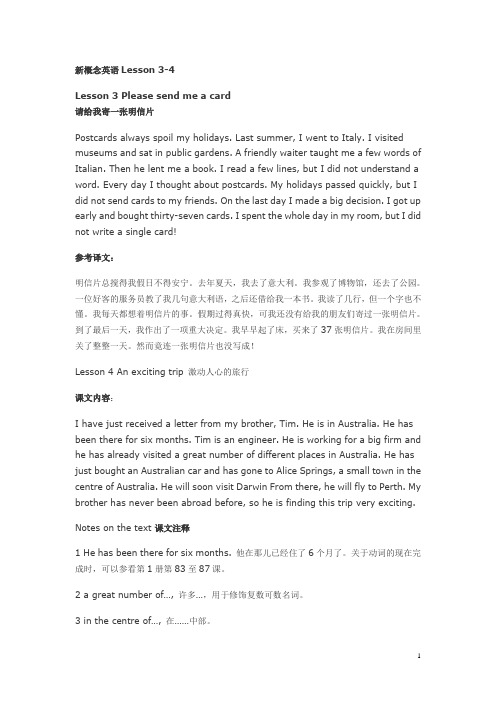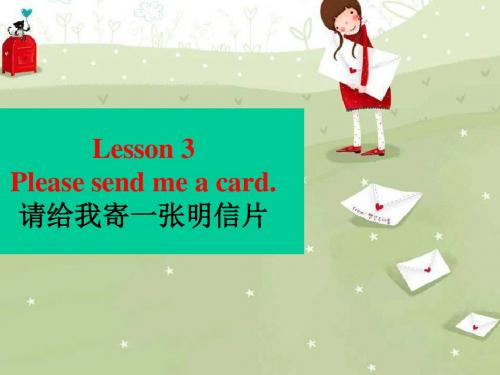Lesson 3 Please send me a card 请给我寄一张明信片课文
- 格式:wps
- 大小:41.50 KB
- 文档页数:4

Lesson 3 Please send me a card 请给我寄一张明信片First listen and then answer the question.听录音,然后回答以下问题。
How many cards did the writer send?Postcards always spoil my holidays. Last summer, I went to Italy. I visited museums and sat in public gardens. A friendly waiter taught me a few words of Italian. Then he lent me a book. I read a few lines, but I did not understand a word. Everyday I thought about postcards. My holidays passed quickly, but I did not send cards to my friends. On the last day I made a big decision. I got up early and bought thirty-seven cards.I spent the whole day in my room, but I did not write a single card!New words and expressions 生词和短语send v. 寄,送friendly adj. 友好的postcard n. 明信片waiter n. 服务员,招待员spoil v. 使索然无味,损坏lend v. 借给museum n. 博物馆decision n. 决定public adj. 公共的single adj. 唯一的,单一的whole adj. 整个的Note on the text 课文注释1 a few words,几句话。



新概念英语Lesson 3-4Lesson 3 Please send me a card请给我寄一张明信片Postcards always spoil my holidays. Last summer, I went to Italy. I visited museums and sat in public gardens. A friendly waiter taught me a few words of Italian. Then he lent me a book. I read a few lines, but I did not understand a word. Every day I thought about postcards. My holidays passed quickly, but I did not send cards to my friends. On the last day I made a big decision. I got up early and bought thirty-seven cards. I spent the whole day in my room, but I did not write a single card!参考译文:明信片总搅得我假日不得安宁。
去年夏天,我去了意大利。
我参观了博物馆,还去了公园。
一位好客的服务员教了我几句意大利语,之后还借给我一本书。
我读了几行,但一个字也不懂。
我每天都想着明信片的事。
假期过得真快,可我还没有给我的朋友们寄过一张明信片。
到了最后一天,我作出了一项重大决定。
我早早起了床,买来了37张明信片。
我在房间里关了整整一天。
然而竟连一张明信片也没写成!Lesson 4 An exciting trip 激动人心的旅行课文内容:I have just received a letter from my brother, Tim. He is in Australia. He has been there for six months. Tim is an engineer. He is working for a big firm and he has already visited a great number of different places in Australia. He has just bought an Australian car and has gone to Alice Springs, a small town in the centre of Australia. He will soon visit Darwin From there, he will fly to Perth. My brother has never been abroad before, so he is finding this trip very exciting.Notes on the text 课文注释1 He has been there for six months. 他在那儿已经住了6个月了。


Lesson 3 Please send me a card 请给我寄一张明信片Postcards always spoil my holidays. Last summer, I went to Italy. I visited museums and sat in public gardens. A friendly waiter taught me a few words of Italian. 'Then he lent me a book. I read a few lines, but I did not understand a word. Every day I thought about postcards. My holidays passed quickly, but I did not send any cards to my friends. On the last day I made a big decision. I got up early and bought thirty-seven cards. I spent the whole day in my room, but I did not write a single card!Lesson 3 Please send me a card 请给我寄一张明信片明信片总搅得我假日不得安宁。
去年夏天,我去了意大利。
我参观了博物馆,还去了公园。
一位好客的服务员教了我几句意大利语,之后还借给我一本书。
我读了几行,但一个字也不懂。
我每天都想着明信片的事。
假期过得真快,可我还没有给我的朋友们寄过一张明信片。
到了最后一天,我作出了一项重大决定。
我早早起了床,买来了37张明信片。
我在房间里关了整整一天。
然而竟连一张明信片也没写成!【课文讲解】1、Last summer, I went to Italy.last:①adj. 上一个last summer 里的last表示“上一个”②adj. 最后一个,表示“最后一个”时要加冠词thethe last day 最后一天(具体到一天及一天的早中晚都要用on)2、A friendly waiter taught me a few words of Italian.Italian 于Italy : 注意重读音的位置不同teach sb. sth. 教某人做某事He teaches our English.(错)He teaches us English.(对)语言不可数, 所以要用a little Italian或a few words of ItalianI can speak a little English/a few words of English.a few可与复数可数名词连用,表示肯定,含有some,a small number of(一些,少数几个)的意思。
第三课Please send me a card 请给我寄一张明信片★1. send 寄,送,派遣,打发cause sb to go or sth to be taken without going oneself(send – sent –sent )1)加双宾语send sb sth = send sth to sb 把东西寄给某人eg. send me a postcard = send a postcard to me 寄给我一张明信片eg. I sent my mother a present on Mother’s day. 在母亲节那天我寄给妈妈一份礼物。
=I sent a present to my mother on Mother’s day.2)加单宾语send sth 寄什么东西send sb 派遣,打发某人send a letter 寄了一封信 send a parcel 寄了一个包裹send the children to bed 打发孩子去睡觉3)send sb my love = give sb my love 代我向。
致意eg. Please send your sister my love. 请把我的问候带给你的姐姐。
=Please send my love to your sister.eg. Please say hello to your brother. = Please say hi to your brother.eg. Remember me to your parents. 代我问候你的父母。
正式的表达Give my regards to your parents. 更为正式的表达4)send for sb 派人去请,去叫。
send for sthsend for a doctor 派人去叫医生send for a taxi 去叫一辆出租车★ 2. postcard n. 明信片card 卡片;贺卡a Christmas card 圣诞卡片 a birthday card 生日卡片a get-well card 康复卡 an identity card 身份证 a post card明信片cards 纸牌 a pack of cards 一副纸牌1)one’s best card = one’s strongest card 某人最好的一张牌,王牌,绝招2) give sb his cards 开出,解雇某人(非正式表达)3) lay one’s cards on the table = put one’s cards on the table 摊牌post n. /v. 邮,寄post-bag 邮袋 post-box (U.S.: mail box) 邮筒,邮箱post-code 邮政编码 post office 邮局postman (U.S.: mailman) 邮递员 post mark 邮戳post-free 免付邮资的,邮资已付的 post-paid 邮资已付的★ 3. spoil-spoiled-spoiled 使索然无味,损坏,破坏,糟蹋-spoilt-spoilt英式英语中多用不规则形式:eg. dreamt; spoilt (Br)美式英语中多用规则形式:eg. dreamed; spoiled (Am)不管英式或美式英语,用过去分词作定语的时候,只用不规则形式。
(资料四):Lesson 3 Please send me a card 请给我寄一张明信片Postcards always spoil my . Last , I went to Italy. I museums and sat in public gardens. A friendlytaught me a few words of Italian. Then he lent me a book. I read a few lines, but I did not understand a . Every day I thought about postcards. My holidays passed quickly, but I did not any cards to my friends. On the last day I a big decision. I got up early and bought thirty-seven cards. I the whole day in my room, but I did not a single card!明信片总搅得我假日不得安宁。
去年夏天,我去了意大利。
我参观了博物馆,还去了公园。
一位好客的服务员教了我几句意大利语,之后还借给我一本书。
我读了几行,但一个字也不懂。
我每天都想着明信片的事。
假期过得真快,可我还没有给我的朋友们寄过一张明信片。
到了最后一天,我作出了一项重大决定。
我早早起了床,买来了37张明信片。
我在房间里关了整整一天。
然而竟连一张明信片也没写成!基本知识:一:一般现在时:表示经常性的事情。
时间状语:often经常, usually通常, always 总是, every每个, sometimes有时, at…在几点钟只有第三人称单数用动词三单,其余动词均用原形三单变化:多数在动词后加s play—plays like—likes 以s,x,sh,ch,o结尾的动词加es go—goes wash--washes 以辅音字母加y结尾,把y改i再加es fly —flies二:基本结构:动词原形(如主语为第三人称单数,动词上要改为第三人称单数形式)三:否定形式:am/is/are+not;此时态的谓语动词若为行为动词,则在其前加don't,如主语为第三人称单数,则用doesn't,同时还原行为动词。
Lesson 3 Please send me a card 请给我寄一张明信片First listen and then answer the question.听录音,然后回答以下问题。
How many cards did the writer send?Postcards always spoil my holidays. Last summer, I went to Italy. I visited museums and sat in public gardens. A friendly waiter taught me a few words of Italian. Then he lent me a book. I read a few lines, but I did not understand a word. Every day I thought about postcards. My holidays passed quickly, but I did not send cards to my friends. On the last day I made a big decision. I got up early and bought thirty-seven cards. I spent the whole day in my room, but I did not write a single card!New words and expressions 生词和短语send(title)/send/(sent/sent/,sent)v.寄,送postcard(1. 1)/'p+ustka:d/n.明信片spoil(1. 1)/sp&il/(spoiled or spoilt/sp&ilt/)v.使索然无味,损环museum(1. 2)/mju:'zi:&m/n.博物馆public(1. 2)/'p)blik/adj.公共的friendly(1. 2)/'frendli/adj.友好的waiter(1. 2)/'weit&/n.服务员,招待员lend(1. 3)/lend/(lent/lent/,lent)v.借给decision(1. 6)/di'si{&n/n.决定whole(1. 7)/h+ul/adj.整个的single(1. 8)/'siRg+l/adj.唯一的,单一的Notes on the text 课文注释1 a few words,几句话。
Lesson 3 Please send me a card 请给我寄一张明信片First listen and then answer the question.听录音,然后回答以下问题。
How many cards did the writer send?Postcards always spoil my holidays. Last summer, I went to Italy. I visited museums and sat in public gardens. A friendly waiter taught me a few words of Italian. Then he lent me a book. I read a few lines, but I did not understand a word. Every day I thought about postcards. My holidays passed quickly, but I did not send cards to my friends. On the last day I made a big decision. I got up early and bought thirty-seven cards. I spent the whole day in my room, but I did not write a single card!New words and expressions 生词和短语send(title)/send/(sent/sent/,sent)v.寄,送postcard(1. 1)/'p+ustka:d/n.明信片spoil(1. 1)/sp&il/(spoiled or spoilt/sp&ilt/)v.使索然无味,损环museum(1. 2)/mju:'zi:&m/n.博物馆public(1. 2)/'p)blik/adj.公共的friendly(1. 2)/'frendli/adj.友好的waiter(1. 2)/'weit&/n.服务员,招待员lend(1. 3)/lend/(lent/lent/,lent)v.借给decision(1. 6)/di'si{&n/n.决定whole(1. 7)/h+ul/adj.整个的single(1. 8)/'siRg+l/adj.唯一的,单一的Notes on the text 课文注释1 a few words,几句话。
2 lent me a book中,lent是“借出”的意思。
我们常说lend sb.sth.或lend sth.to sb.。
borrow是“借入”的意思,常用的结构是borrow sth.或borrow sth.from sb。
参考译文明信片总搅得我假日不得安宁。
去年夏天,我去了意大利。
我参观了博物馆,还去了公园。
一位好客的服务员教了我几句意大利语,之后还借给我一本书。
我读了几行,但一个字也不懂。
我每天都想着明信片的事。
假期过得真快,可我还没有给我的朋友们寄过一张明信片。
到了最后一天,我作出了一项重大决定。
我早早起了床,买来了37张明信片。
我在房间里关了整整一天。
然而竟连一张明信片也没写成!Summary writing 摘要写作Answer these questions in not more than 50 words.回答下列问题,将答案组成一个段落,不要超过50个单词。
1 Do postcards always spoil the writer's holidays or not?2 Where did he spend his holidays last summer?3 What did he think about every day?4 Did he send any cards to his friends or not?5 How many cards did he buy on the last day?6 Where did he stay all day?7 Did he write any cards or not?Key structures 关键句型What happened? 一般过去时Read this short conversation. Pay close attention to the verbs in italics. Each of these verbs tells us what happened.读一读下面的这段对话,要特别注意用斜体印出的动词,每个动词都告诉我们发生了什么事情。
POLICEMAN: Did you see the accident, sir?先生,你看到那个事故吗?MAN: Yes, I did. The driver of that car hit that post over there.是的,我看到了。
那辆车的司机撞到那边的杆子上?POLICEMAN: What happened?发生了什么事情?MAN: A dog ran across the road and the driver tried to avoid it. The car suddenly came towards me. It climbed on to the pavement and crashed into that post.一条狗穿过马路,那位司机企图躲开狗。
突然,汽车朝我开过来。
它走上人行道,撞到那根杆子上。
POLICEMAN: What did you do?你做了什么?MAN: I ran across the street after the dog.我穿过马路去追狗。
POLICEMAN: Why did you do that? Were you afraid of the car?你为什么这样做呢?你怕汽车吗?MAN: I wasn't afraid of the car. I was afraid of the driver. The driver got out of the car and began shouting at me. He was very angry with me. You see, it was my dog.我不怕汽车,我怕那个司机。
他下了车,开始朝我喊了起来。
他对我很生气。
你知道的,那是我的狗。
Exercises 练习A Look at the passage‘Please send me a card’. Put a line under all the verbs which tell us what happened to the writer when he was on holiday in Italy.重读课文,找出那些说明作者在意大利度假时所发生的事情的动词,在这些动词的下面划上横线。
B Give the correct form of all the verbs in parentheses. Do not refer to the passage until you finish the exercise.用正确的时态填空,完成练习后再对照课文核对你的答案。
Last summer, I ______ (go) to Italy. I ______ (visit) museums and ______ (sit) in public gardens. A friendly waiter ______ (teach) me a few words of Italian. Then he ______ (lend) me a book. I ______ (read) a few lines, but I ______ (not understand) a word. Every day I ______ (think) about postcards. My holidays ______ (pass) quickly, but I ______ (not send) cards to my friends. On the last day, I ______ (make) a big decision. I ______ (get) up early and ______ (buy) thirty-seven cards. I ______ (spend) the whole day in my room, but I ______ (not write) a single card!C Give the correct form of the verbs in parentheses in the passage below. Each verb must tell us what happened.用正确的时态填空,每个动词都必须告诉我们发生了什么事情。
My friend, Roy, ______ (die) last year. He ______ (leave) me his CD player and his collection of CDs. Roy ______ (spend) a lot of money on CDs. He ______ (buy) one or two new CDs every week. He never ______ (go) to the cinema or to the theatre. He ______ (stay) at home everyevening and ______ (listen) to music. He often ______ (lend) CDs to his friends. Sometimes they ______ (keep) them. He ______ (lose) many CDs in this way.Special difficulties 难点英语中有些动词可以带两个宾语,这些动词大多具有“给与”的含义。
如课文中第3行的句子“He lent me a book”中,动词lent后面带有表示动作结果的直接宾语(a book)和表示动作目标的间接宾语(me)。
间接宾语在大多数情况下置于直接宾语之前,如果间接宾语在后,间接宾语前必须加“to”(表示动作对什么人而做)或“for”(表示动作为什么人而做),因此,课文中的句子也可以改写成:He lent a book to me. 注意以下例句。